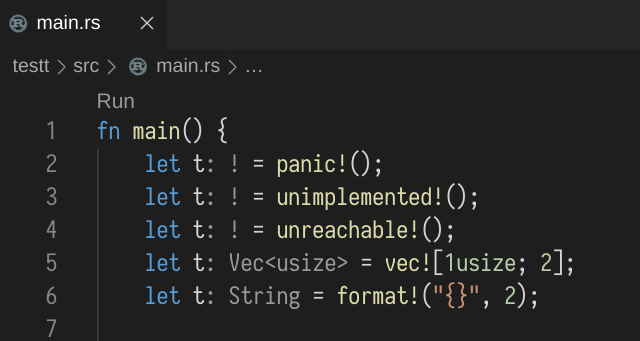We need to be more careful now when substituting bound variables (previously, we
didn't have anything that used bound variables except Chalk, so it was not a
problem).
This is obviously quite ad-hoc; Chalk has more infrastructure for handling this
in a principled way, which we maybe should adopt.
1928: Support `#[cfg(..)]` r=matklad a=oxalica
This PR implement `#[cfg(..)]` conditional compilation. It read default cfg options from `rustc --print cfg` with also hard-coded `test` and `debug_assertion` enabled.
Front-end settings are **not** included in this PR.
There is also a known issue that inner control attributes are totally ignored. I think it is **not** a part of `cfg` and create a separated issue for it. #1949Fixes#1920
Related: #1073
Co-authored-by: uHOOCCOOHu <hooccooh1896@gmail.com>
Co-authored-by: oxalica <oxalicc@pm.me>
1815: Support correct `$crate` expansion in macros r=uHOOCCOOHu a=uHOOCCOOHu
This PR makes normal use cases of `$crate` from macros work as expected.
It makes more macros from `std` work. Type inference works well with `panic`, `unimplemented`, `format`, and maybe more.
Sadly that `vec![1, 2, 3]` still not works, but it is not longer an issue about macro.
Screenshot:

Co-authored-by: uHOOCCOOHu <hooccooh1896@gmail.com>
This is only allowed for generic parameters (including `Self` in traits), and
special care needs to be taken to not run into cycles while resolving it,
because we use the where clauses of the generic parameter to find candidates for
the trait containing the associated type, but the where clauses may themselves
contain instances of short-hand associated types.
In some cases this is even fine, e.g. we might have `T: Trait<U::Item>, U:
Iterator`. If there is a cycle, we'll currently panic, which isn't great, but
better than overflowing the stack...
E.g. `fn foo<T: Iterator>() -> T::Item`. It seems that rustc does this only for
type parameters and only based on their bounds, so we also only consider traits
from bounds.
1795: Make macro scope a real name scope and fix some details r=matklad a=uHOOCCOOHu
This PR make macro's module scope a real name scope in `PerNs`, instead of handling `Either<PerNs, MacroDef>` everywhere.
In `rustc`, the macro scope behave exactly the same as type and value scope.
It is valid that macros, types and values having exact the same name, and a `use` statement will import all of them. This happened to module `alloc::vec` and macro `alloc::vec!`.
So `Either` is not suitable here.
There is a trap that not only does `#[macro_use]` import all `#[macro_export] macro_rules`, but also imports all macros `use`d in the crate root.
In other words, it just _imports all macros in the module scope of crate root_. (Visibility of `use` doesn't matter.)
And it also happened to `libstd` which has `use alloc_crate::vec;` in crate root to re-export `alloc::vec`, which it both a module and a macro.
The current implementation of `#[macro_use] extern crate` doesn't work here, so that is why only macros directly from `libstd` like `dbg!` work, while `vec!` from `liballoc` doesn't.
This PR fixes this.
Another point is that, after some tests, I figure out that _`macro_rules` does NOT define macro in current module scope at all_.
It defines itself in legacy textual scope. And if `#[macro_export]` is given, it also is defined ONLY in module scope of crate root. (Then being `macro_use`d, as mentioned above)
(Well, the nightly [Declarative Macro 2.0](https://github.com/rust-lang/rust/issues/39412) simply always define in current module scope only, just like normal items do. But it is not yet supported by us)
After this PR, in my test, all non-builtin macros are resolved now. (Hover text for documentation is available) So it fixes#1688 . Since compiler builtin macros are marked as `#[rustc_doc_only_macro]` instead of `#[macro_export]`, we can simply tweak the condition to let it resolved, but it may cause expansion error.
Some critical notes are also given in doc-comments.
<img width="447" alt="Screenshot_20190909_223859" src="https://user-images.githubusercontent.com/14816024/64540366-ac1ef600-d352-11e9-804f-566ba7559206.png">
Co-authored-by: uHOOCCOOHu <hooccooh1896@gmail.com>
Some method resolution tests now yield `{unknown}` where they did not
before.
Other tests now succeed, likely because this is helping the solver
steer its efforts.